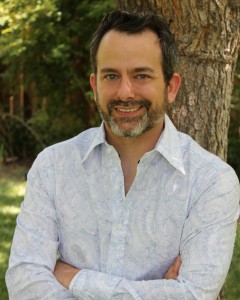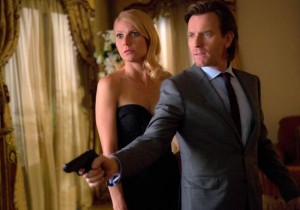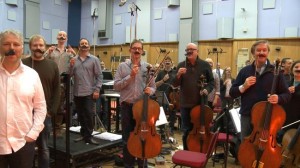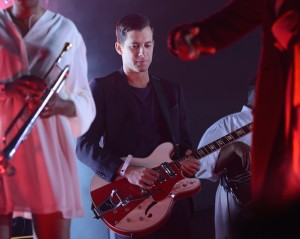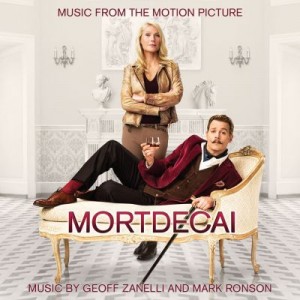There’s no doubt that the O.G. masters of movie score Shagadelia knew they were being funny back in the ultra-60s day when Burt Bacharach had various James Bonds bouncing to the Tijuana Brass, or Charles Fox and Bob Crewe were disrobing Barbarella from her space suit to the strains of a female chorus and a funk guitar. Now with the groovy one-two punch of George S. Clinton and David Holmes making already-hip retro rhythms cool again for Austin Powers’ wacky spy jazz and the rocking organ-guitar grooves of twelve con artists pulling a big Vegas rip-off, everything old is way-out cool again. However, in a Hollywood scoring scene filled with rhythmic strains of period-specific psychedelic satire, it can be a challenge to bring something truly new to a happening.
That being said, MORTDECAI (which just came out on DVD and Blu-ray) brings new fresh flair to the groovy party, or more specifically the search for a stolen painting. The chase is led by Johnny Depp, here crossing Jacques Clouseau with Terry Thomas as he plays novelist Kyril Bonfiglioli’s vainly aristocratic art seeker. As adapted by STIR OF ECHOES filmmaker David Koepp to show his far funnier writing-directing side, MORTDECAI eccentrically hits the screen as personified by a gadfly with more moustache than brains – though sure to get the job done with help of his ultra-hot (and way smarter) wife Johanna (Gwyneth Paltrow) and very physical manservant Jock Strapp (Paul Bettany). Jet setting the search where art is worth its weight in Nazi gold is a score that’s wonderfully all over the Shagedelic place, not only slamming in the rocking guitars, harpsichords, organ and brassy spy jazz strains, but also shaking its over-liquored martini with Russian chorus and switched-on Bach.
There’s never been quite a flavorfully hip retro score like MORTDECAI, a wonderfully absurdist, yet, surprisingly thematic concoction given that many scores like it say motifs be damned as they go for one self-contained groove of the moment, often to exhaustive effect. But that sure isn’t the case for this ultra-60s soundtrack that’s made so spot-on thanks to the inspired teaming of Geoff Zanelli and Mark Ronson. The first member of the duo started out on Team Zimmer with additional music on dozens of diverse scores like PEARL HARBOR, THE LAST SAMURAI and MATCHSTICK MEN, whose Esquival-esque grooves most portended to MORTDECAI. Making his big feature impression playing Depp as a psycho killer for Koepp 2004 Stephen King adaptation SECRET WINDOW (and continuing his Koepp collaboration on the far funnier GHOST TOWN), Zanelli impressed both on the big screen with DISTURBIA, OUTLANDER and THE ODD LIFE OF TIMOTHY GREEN while showing his epic talents on TV with the Emmy-winning miniseries INTO THE WEST and a nomination with THE PACIFIC (shared with Zimmer and his WEST collaborator Blake Neely).
Yet perhaps no project has hinted as to just how wackily far out Zanelli could go than with the trippily elegant escapades of MORTDECAI, especially when partnered with English-born, international DJ extraordinaire Mark Ronson, making his feature scoring debut here after seeing his songs featured in such shows and movies as ENTOURAGE, GLEE, STEP UP and THE GREAT GATSBY. It’s a fusion of movie scoring smarts and record-bin hopping, tune-producing dexterity that brings the usual suspect Samba rhythms, fat brass and cooing vocals a hilarious authenticity that makes MORTDECAI already one of 2015s most energetic, and entertaining scores straight out of the gate, a collaboration that Zanelli now waxes his fake moustache poetically on.
ASSIGNMENT X: Did the idea immediately hit you to do a retro-caper score for MORTDECAI?
GEOFF ZANNELI: Yes, it hit all of us, actually. I’ve kept in touch with MORTDECAI‘s director David Koepp ever since we did SECRET WINDOW many years back, so when he got the film green-lit I was on the phone with him shortly after. And he told me about the story, sent me the script, and said he wanted to see about me co-writing the score with Mark Ronson, whose record “Version” had been on his mind as inspiration. This is what I love about David. He hears great music and sees an opportunity to create collaboration. So the retro-caper idea was there before a single frame was even shot.
I had a meeting with Mark within a week or two after that phone call and he and I got on great. We just knew we’d work well together and came-up with something unique. He and I value authenticity immensely, so our first conversations were about how to get the authentic sound, which means finding the right musicians, the right studios, analogue equipment, vintage instruments and all of that. Then we went to our separate caves and started writing in isolation for a little while so we’d both start from our purest ideas. Two weeks later we got together to show each other what we’d been up to, and we found enough overlap in the musical language so that we each gravitated towards each other’s. It was really simple to get our ideas to play nice together. From then on, we wrote together for most of it – which is to say we crammed every corner of my studio with old amps and instruments from the 60s just to get the right sound from the get-go. Mark and I played almost everything as we wrote, knowing that we’d have the Dap Kings in New York play the final versions along with some of the horn players from The Roots, plus an orchestra, percussion, horn section, vibraphone, harpsichord and clavinet at Abbey Road.
AX: Were there any swinging 60s scores or pop artists that you particularly turned to for inspiration? Or more recent “retro” scores that took their groove from them?
ZANNELI: We were definitely aiming at the original, authentic 60s vibe moreso than what you may think of as the modern-retro scores. And while there weren’t particular scores we turned to, I certainly had in mind the playfulness of Henry Mancini, Esquivel and Quincy Jones. But you’ll find all sorts of influences at play here. The goal was to find a way of doing old soul, new vibe. We wanted to combine a centuries old aristocratic aesthetic with 60s instrumentation and a modern approach in a way that felt fresh, but still acknowledged the very clear roots MORTDECAI had.
AX: How did you do such a spot-on recreation of this very specific vibe in terms of orchestration, the use of female vocals and sound recording? Were there any instruments you knew that you just had to have?
ZANNELI: Oh I knew for sure I needed a harpsichord. A very crusty, dusty, pretentious sounding one. I found a woman in London who had a collection of them and she recorded each one so I could choose the crustiest. And then we doubled that with a clavinet through one of Mark’s refurbished 1960s guitar amps to get this perverse aristocracy-turned-on-its-head sound. Mark coined the phrase “Harpsichord Aristo-Funk” which I think is as good a description of this score as any. But vibraphone, saxophones, spy guitar, soul band, funky horn section and of course an orchestra all had to show up here, and a Russian choir for good measure! And for the first time in my 20-year career I got to call in a flugelhorn. The reason the vibe feels authentic is because Mark and I both have a deep love of these instruments, this style and this music. So great care and careful consideration played a part in every step of the process, right down to which microphones to use and what rooms to record this all in.
You mentioned the female vocal that I agree really elevates the score. That’s Rose Elinor Dougall. She’s singing the love theme for the film, which is something that Mark and I came-up with together in the studio in a very rough state. Then I went off and did this arrangement with really every instrument you could ever want to record, including that flugelhorn I talked about. When I played that to Mark it had a little fake choir in there and I was thinking about how to find singers who could pull of that 60s pop ensemble singing that you’ve heard. Mark’s idea was to go slightly more modern with it and get Rose to try it. She was perfect, of course, and she even got inspired to write a song based on that which plays in the film as well, called “Heart’s a Liar.” So that’s just another fantastic success story here in terms of the way we’re all able to collaborate and inspire each other.
AX: At the same time, how did you want to make a retro score like MORTDECAI fresh for today’s audiences who might not be onto the musical joke?
ZANNELI: Well that’s the whole trick, isn’t it? One of the ways was what I was saying earlier about pairing 60s instruments with either something old and aristocratic, or something more modern. Another would be to turn things upside down by taking something old and playing it with a modern style. The film has Bach’s Toccata and Fugue on organ in one spot, and without spoiling the scene for your readers I’ll just say it’s used as a source cue in the film. And then as it goes on it becomes a mash-up with a funky drum kit, and soul organ part takes over, so we’re getting a little irreverent with Bach’s greatest hits… And I was always looking for instruments that have a dual function. Like a trumpet for instance, which can be very classical but it can be very funky, so you can play it in two different contexts as the story progresses. The mission was to get the band and horn section to feel like they have equal weight with the orchestra or any of the more conventional film score tools. That also plays right into the idea that this score is a “two-headed monster,” as David once called it, what with Mark and I both on it.
AX: Was there a danger in the music thinking it’s too funny or forced, especially when you’ve already got such an eccentric hero?
ZANNELI: There’s a huge danger! That was the most difficult part of the whole score, actually, finding the sweet spot for how to play the comedy. You don’t want to go and be overtly comedic cause it makes things corny instantly, but we also found if you play everything completely straight, it almost comes off like you’re doing a parody. It’s a strange thing, that overly serious music makes things feel too light or silly, but it really does happen. The answer for this score was to find styles to juxtapose against the action, and then lean away from scoring too tightly to picture, or being cartoony.
AX: There’s also more than a bit of the sound of “spy jazz” in how you use John Barry-esque strings and brass in the score. How do you think that adds to the caper feeling, and how did you want to incorporate an orchestral approach with the period pop one?
ZANNELI: When I visited the set for the film, David Koepp told me his two most frequent directions to everyone on the movie would be “Remember, it’s a caper!” and “Faster!” So the idea that this is rooted in a caper story was there from the start. The electric guitar gets to do a lot of the heavy lifting with the spy music for Ewan McGregor’s character Martland, but I’m doubling that with the orchestra pretty often, which is another of the ways we were marrying the orchestral world with the soul band instruments. I think the way those elements work together is what makes it feel like a caper. Mark and I weren’t afraid of going into the musical language that makes it feel like spy jazz, as you said. Or spy funk, or spy soul, if such a thing exists.
AX: What do you think Johnny Depp’s own Clouseau-like eccentricity here brings to the character, and subsequently your approach for him?
ZANNELI: We all know that Johnny can create a character like no one else with his performances. And I use the performances in a movie to inspire my writing in almost all cases. You’ve got a colorful character with a rich, aristocratic lineage who is now living the life of a rogue, basically, so I can go and be colorful with the instrumentation I use, and I have the vast reservoir of music that is “aristocratic” to draw from. And I found if I turn that on its head or pervert it in some way it led to interesting results. So we approached his music with a certain irreverence, a nod to Mortdecai’s entitlement, a ton of charm and maybe an ounce of cluelessness.
ZANNELI: With a great, classic love theme and a flugelhorn! Johanna, his wife, is always calmer and cooler than Mortdecai, and she’s really much smarter than he is as well so she’s playing the big role in solving the mysteries. And they’re at odds with each other so often, so she gets her own cool vibe for some of the score. But when it comes to their relationship I needed everything to thaw. I wanted soft focus, Vaseline on the camera lens, and some combination of old soul records plus exotica records did the trick.
AX: How did you want the music to play the various ethnic characters that are chasing after Mortdecai?
ZANNELI: Mortdecai makes a few enemies and I wanted each to have their own music. So the Russians, they this big men’s choir and a muscular tune. I won’t even tell you what the lyrics translate to, but someone somewhere is going to get a kick out of them! Emil Strago (Jonny Pasvolsky) is another of the bad guys who wants to track this expensive painting down to fund his terrorism efforts, so he gets a darker, more seriously threatening theme.
ZANNELI: I think what drew David to the story was it has all the makings of a classic 60s era caper, which is a genre I know he’s very fond of. It’s also built around very snappy dialogue, which I’m sure was fun for him to work with as well. He and I have a shorthand now, on our third film, so our collaborations go very smoothly. He’s very articulate about his thoughts on the music, and gives clear direction all the time. He gave me the greatest compliment once by saying, “You write the best second draft in the business!” So I understand where he’s coming from, in other words, just as well as he understands me. I’m also not afraid to play him rough ideas or experiments because he fosters an environment where I’m able to work and try things, and even fail for a while without any fear.
ZANNELI: The songs came about organically, after most of the score had been written. So we did it backwards in a way, which is to say Mark and I worked for months on the score and then went “I bet some of these themes will work as songs.” And since the themes for the film were already character-specific, it meant the song would already be tied to the characters or to the love story before we do anything with it. Then it was a matter of finding a song form for them and building it into something where there’s room for a lyric and vocal. Again, these were collaborative efforts with Mark, myself and the artists who sang the songs. For “Johanna” that was Miles Kane and Ben Garrett, and for “Heart’s A Liar” it was Rose Elinor Dougall.
ZANNELI: That one presented itself naturally since it was a source cue that morphed into a score cue. And I think a cue like that is very much informed by a DJ mindset, where you’d be looking for ways to take something that exists and put a new idea into it to inject fresh life. So that’s an overt example of that in the score, but the concept pervades almost every note. “How can we take an established sound and make it fresh while not losing what made it strong and compelling to begin with?”
AX: What do you think MORTDECAI will do for the whole genre of hip retro-scores?
ZANNELI: Well, it’s certainly one way of doing a retro score without it feeling like a parody or watering it down in any way. I think it’s such a unique film and such a special opportunity that it’s hard to know how it would apply to other films that could go that way. So I think what it does for the genre is really up to how people receive it. I know we worked hard at the authenticity here, which is something I’d hope resonates with people who watch the movie.
ZANNELI: I think the score we have here is so symbiotic with the character Mortdecai that if his story continues some of that would continue as well. But there wouldn’t be a reason to make a second film if the character and the story don’t evolve, which would mean the score evolves too.
MORTDECAI is now on DVD and Blu-Ray. Buy Geoff Zanelli and Mark Ronson’s score MORTDECAI score on La La Land Records HERE
Visit Geoff Zanelli’s website HERE
Visit Mark Ronson’s website HERE
http://www.markronson.co.uk
AGREE? DISAGREE? LET YOUR VOICE BE HEARD – COMMENT BELOW
Click on the link to Purchase the BLOW OUT soundtrack
Related:More ASSIGNMENT X soundtrack reviews
Follow us on Twitter at ASSIGNMENT X
Fan us on Facebook at ASSIGNMENTX
Article Source: Assignment X
Article:CD Review of the BLOW OUT soundtrack
Related Posts:








